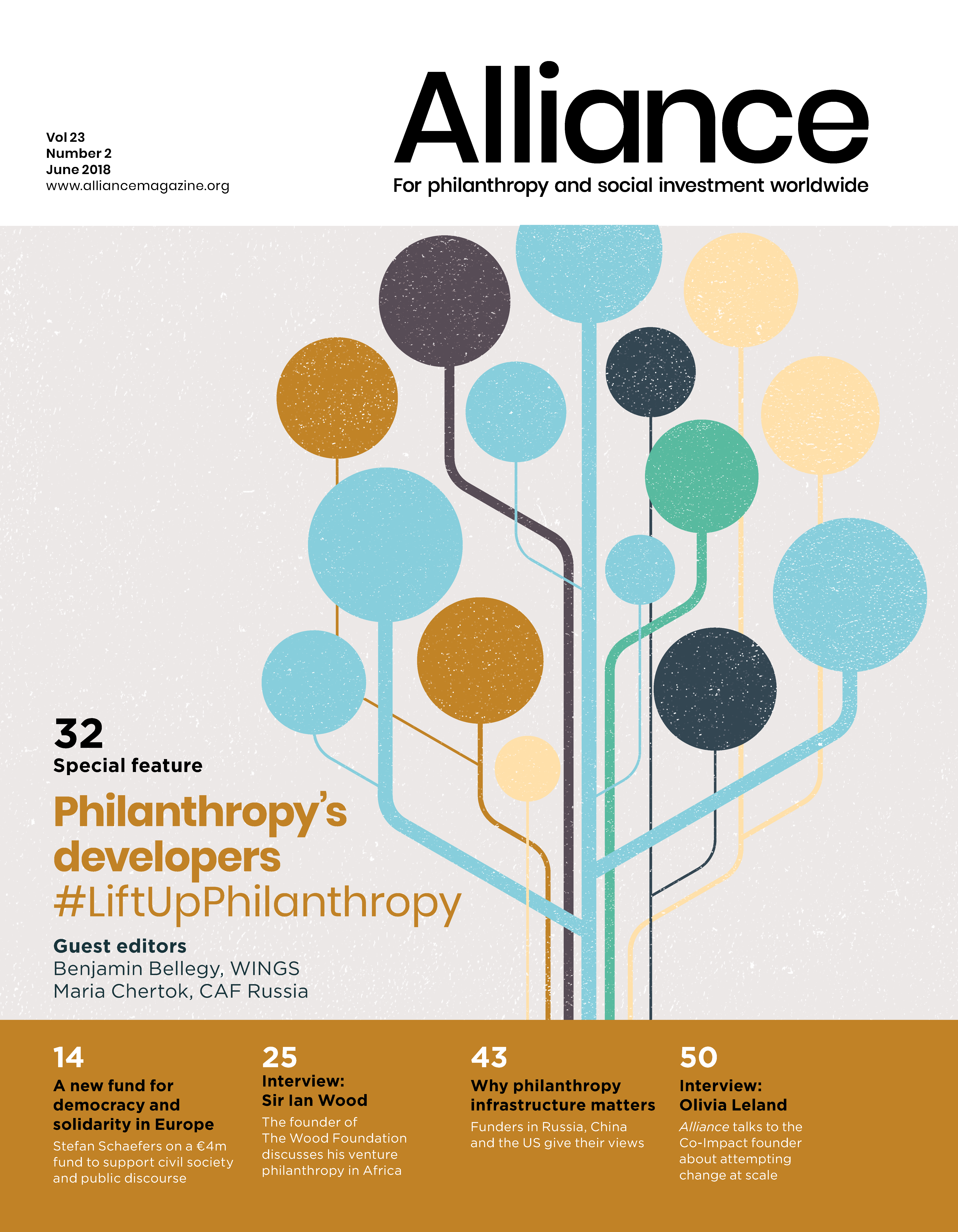Philanthropy infrastructure is a crucial tool that enables the realization of potential to nurture philanthropic pursuits
Yanni Peng of Narada Foundation, Vladimir Potanin and Oksana Oracheva of Vladimir Potanin Foundation and Ridgway White of Mott Foundation discuss the crucial importance of investing in philanthropy infrastructure and underline how a dynamic approach can achieve a greater scale of impact.
 Yanni Peng, CEO of Narada Foundation
Yanni Peng, CEO of Narada Foundation
In 2007, Narada Foundation gave a three-year grant to Non-Profit Incubator (NPI), the very first incubator for non-profit organizations in China. And this is the first philanthropy infrastructure we invested in. The grant was used to cover NPI’s running costs. Within five years, the landscape of non-profits was totally changed – a substantial number of new grassroots NGOs had emerged and had begun to show their impact. The second piece of philanthropy infrastructure we co-initiated and funded is the China Private Foundation Forum where private foundations network and share learning and concerns with each other. We have funded it for nine consecutive years. Now known simply as China Foundation Forum, it has significantly energized the foundation sector in China and its annual conference is now regarded as the most influential networking platform for Chinese foundations. Its 2017 annual conference attracted nearly a thousand participants from foundations and non-profits including 200 foundation CEOs and board chairs.
These are just two examples of the kinds of philanthropy infrastructure Narada Foundation has funded and supported. We have witnessed the enormous value they have created for the non-profit and philanthropy sector. Compared to funding individual non-profit, the effects for the sector of supporting infrastructure are multiplied. It encourages new organizations to be set up, builds NPOs’ capacity, enhances the sectoral information and data flow, establishes sectoral ethics and standards, strengthens networks at various levels, and is an advocate for a better legal and regulatory framework. All of these are indispensable for the non-profit and philanthropy sector to thrive. It is also a more efficient way for funders who want to support the sector. One infrastructure organization can reach and serve anything from a few dozen non-profits and foundations to thousands. In other words, by supporting the infrastructure organizations, we can actually achieve impact on a much greater scale.
At Narada Foundation we have learned that the impact of supporting sectoral infrastructure takes time to make itself felt. Funders have to be patient which means they need to be prepared to provide multiple-year grants, accept the fact that there won’t be much immediate return, be comfortable to be not in the spotlight, and also tolerate failures. And while funding is important, it is far from enough to build an effective infrastructure organization. We need to link them to other networks, introduce them to other funders, build up their capacity and contribute to their board governance.
In a nutshell, building up philanthropy infrastructure needs determination, patience and skill. But it is well worth the effort.

Ridgway White, president of the Charles Stewart Mott Foundation
There are many reasons why supporting philanthropic infrastructure is an essential part of the Mott Foundation’s work. Here are three:
The first goes to the heart of our existence. Philanthropies cannot take for granted our right to exist, the ability to do the work we do or the kind of trust we want others to invest in us. Through our work in Central and Eastern Europe, we have seen governments suppress civic engagement by creating laws which make it impossible for the independent sector to have an independent voice. In the US, infrastructure organizations have defended us against burdensome changes in the tax code. They have also resisted special interest groups who tried to strip prohibitions barring political activity, which would have destroyed trust in the charitable sector.
Secondly, infrastructure organizations nurture the philanthropic sector and charitable organizations, helping us to improve our work, build capacity and share knowledge with one another. In doing so, they equip the sector to respond to the most serious challenges of our times – both those we see coming and those that take us by surprise.
And that leads me to the third reason: all of us count on the wider charitable sector to respond when government and the private sector fail to protect people. Our foundation witnessed the importance of this role in our hometown of Flint, Michigan. We saw the value of strong non-profits working collaboratively during the darkest days of the city’s water crisis. Non-profit leaders were the first to discover elevated lead levels in our city’s children, and they also were the first to help while government officials were still pointing fingers. Three years later, they continue their efforts to help the city recover and rise.
As trusted members of the local community, Flint non-profits serve as a vital link between policymakers and the public. This trust comes when organizations function well, are governed well and are in tune with the people they serve. Infrastructure organizations help make that possible.
Flint non-profits were ready to help when crisis hit, due in part to long-term support from regional and national infrastructure organizations. For Mott, this example also rings true across our national and international work – from Flint to the Amazon, Central and Eastern Europe, and South Africa.
Creating and maintaining a robust infrastructure isn’t a problem to be solved. It’s a never-ending process that is essential to nurturing and sustaining a strong philanthropic and non-profit sector and a vibrant civil society. The Mott Foundation would never want to see a world where civil society fades away because we didn’t do all we could to sustain and protect it.
 Vladimir Potanin, founder of the Vladimir Potanin Foundation
Vladimir Potanin, founder of the Vladimir Potanin Foundation
I believe that strong philanthropy needs professionals and partnerships. We cannot afford to rely on emotions and stay in our own small world. We need to be ahead in our technologies, instruments and practices to be real leaders who care about communities in need, value every opinion, and want to build a better society. To do that successfully, charities need to take professional decisions, as business leaders do. We need the ideas and the creative solutions the best people can offer. But we are not alone. As in business we need to be transnational and global, we need mutual understanding, we need true partners in every sphere – our own communities, business, media and the state. Think of it like an ice hockey team – each player brings a unique personality to the team but only through cohesion and working together can the team win. We need institutions capable of building such a team which will connect individual ability with the power of partnership.
 Oksana Oracheva, general director of the Vladimir Potanin Foundation
Oksana Oracheva, general director of the Vladimir Potanin Foundation
The complexity and global nature of today’s problems – economic, ecological, political, educational and even cultural – increases people’s distrust in institutions. Many of them, not excluding charities, have failed to provide timely and effective responses to people’s needs and it’s legitimate for both donors and the communities we serve to ask: do we really need to spend money on philanthropy infrastructure? In the era of the internet and blockchain, could we leave institutions aside?
We at the Vladimir Potanin Foundation have no doubt that it is far too early to say that institutions do not matter. All our grantmaking experience justifies the view that setting up clear and just rules of the game, having in place professional services, relying on research in our decision-making, and supporting knowledge building and professional development are all crucial for achieving long-term positive change.
In order to build something that might even last beyond our own lives, we believe there is a need to invest in three elements: individuals, creative ideas and institutions that are crucial to implementing the ideas leaders have. In none of these areas are immediate and easily measurable results possible. That means we should invest in building trust and promoting the core human values that will be part of a better society.
That is why philanthropy development along with education and culture is one of the core areas of our support.







Comments (0)